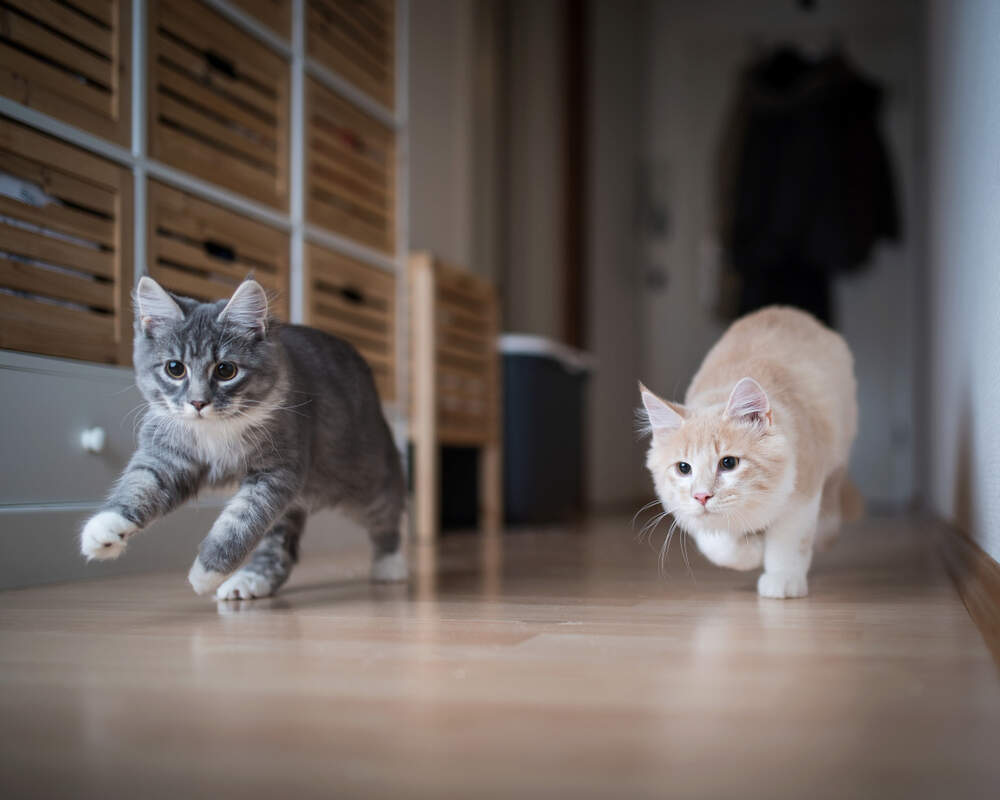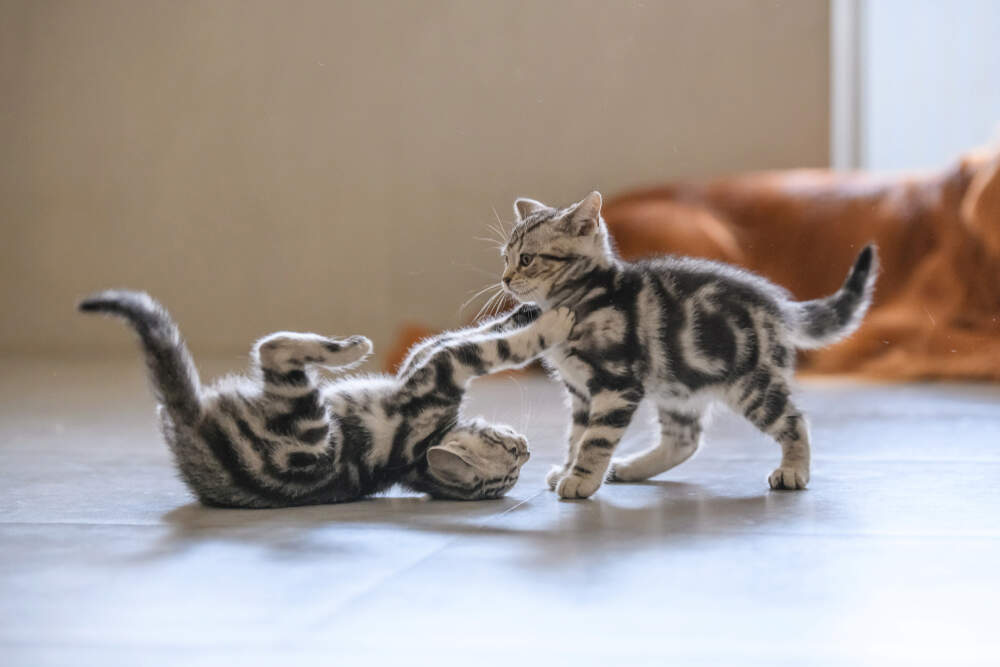Help Reduce Conflict in a Multi-Cat Household
Cats are naturally independent creatures that like to control their environment and prefer structure in their surroundings. Sometimes, an additional cat might leave your kitty feeling threatened and unable to control her environment. She may display this stress in ways that make her look mean or cause her to "act out." Thankfully, there are steps you can take to help your cat feel less stressed, leading to her being nicer and more approachable overall.
Your Cat Might Act Out if She Feels Stressed
If you're not sure if your cat is stressed, consider the following stress symptoms that might clue you in. A stressed cat might act destructively, making it tougher to know there's an issue unless you know what signs to look for.1
- Urine spraying, marking, pooping outside the litter box, or not covering after using the litter box.
- Extra vocalization
- Destructive scratching, whether vertically or even on your carpet (horizontally)
- Causing conflict with you or your other pets
- Digestive issues, like constipation or diarrhea
- Excessive grooming
While some stressed cats may indeed withdraw, others will become an instigator. If your cat displays a sudden change in behavior, you might want to visit a veterinarian to rule out any health issues. Once you've ruled that out, look into the following solutions to help ease your cat's stress.
Give Your Cats Their Own Territory
A cat that feels like she doesn't have a territory of her own might start acting defensively or causing conflict. Give your cats their own territory, so they feel more confident.
Create multiple access points for valuable resources and spread these throughout the house and on each floor (if your home has more than one story) to avoid competition for access. This includes providing a litter box for each cat plus one extra box and setting up multiple food stations and drinking opportunities away from the food. You also want to provide enough climbing, hiding, and sleeping areas for all your cats so no one has to compete.
You might also want to set up some cat trees, condos, and window perches around the house. The more territory your cat can "claim" as her own, the more confident she'll feel. Also, only use sleeping perches that are big enough to fit one cat at a time, so your cats don't crowd each other on one perch.
Calming Diffusers Can Help
Setting up calming diffusers around the house can also help ease your cats' stress. The Comfort Zone Multi-Cat Diffuser can help calm your cats when they have to share space in your home. The diffuser mimics your cats' natural pheromones that tell your fur babies everything is safe and okay. Set the diffusers up in multiple rooms where your cats hang out the most.
Slow Introductions (or Re-Introductions) Can Help
Cats are territorial creatures. A bad or quick introduction might lead to your cat feeling more territorial and defensive. To help reduce fighting later on, slowly introduce a new cat into your home.
If your cat was scared around another household cat, she might displace her fear onto that cat. This is sometimes why cats that always got along just fine suddenly start fighting. In those cases, you might need to reintroduce your cats. Whether a first-time introduction or a re-introduction, follow the steps below.
1. Introduce Your Cats by Smell
Introduce the smell of your new cat to your current cat so she won't be unsettled or threatened when they first meet. Give her a blanket or toy the new cat has slept on or played with. Alternatively, let her sniff around the new cat's carrier when she's not in it.
2. Take Turns
For the first week or two, play with the cats separately, taking turns, so they smell each other on you and become familiar with each other. Keep them in separate rooms and switch out those rooms periodically.
3. Dinner for Two
Using two separate bowls placed next to one another, feed the cats at the same time. They'll learn to associate mealtime with being close to the other cat and will be less likely to fight during the day. You might need to feed them on either side of a closed door or full-sized screen first before feeding them in the same room.
Introduce New Kittens Slowly
Be cautious when introducing your new kitten to your home. Kittens are fragile, and safe introductions may take time. When done correctly, this can help your adult cats more readily accept your kittens.
1. Keep Them Separated
For the first few days (at least) of a new kitten's time in your home, keep the cats separated from each other. Let the kitten have free roam of a closed room in the house. The adult cat will hear the meowing and sense the movement from behind the door.
2. Let Them Sniff Around
Place your kitten in her carrier in the middle of the living room and let the adult cat sniff around. Don't be afraid if they hiss and bat their paws or snort and hunch their backs. That's to be expected, and it's okay for them to do this. Try to give them treats or other items that help build positive associations.
3. Love Them Equally
Keep the cats separated in crates or different rooms until they accept each other, which can take a few weeks. When they begin to tolerate one another, make sure you play with them equally and show equal amounts of affection. You don't want either one to feel jealous of the other.
How to Handle Neighborhood Animals Causing Stress
Cats can especially get stressed by neighborhood cats, even if they never come inside the house, and they may take that stress out on other household cats. Seeing a feral cat wander outside can be enough to cause your cat stress. Try closing the blinds or even using motion-activated sprinklers to keep feral cats away from your home.
Remember, decreasing stress can take time. If your cat is acting uncharacteristically, it might take a few weeks or more to build new habits and help your pet feel secure. But with patience and love, your cats can learn to get along again.
1. Negron, Vladimir. "10 Signs Your Cat Might Be Stressed." PetMD, 20 June 2014, https://www.petmd.com/cat/centers/nutrition/slideshows/signs-your-cat-might-be-stressed?view_all=1.




